Matt Rees's Blog - Posts Tagged "samaritans"
Global Post features my articles on Nablus, the Samaritans from my new novel
The new U.S. website Global Post, which aims to provide Americans with the foreign news that they're missing since their newspapers fired almost all their international correspondents, features a series of stories by me. They're intended as introductions to my new Palestinian crime novel, THE SAMARITAN'S SECRET -- colorful features about life for the Palestinians who appear in the book. The second article tells how I came to know the remnants of the ancient Samaritans, living on a hilltop overlooking Nablus. Both articles include photographs I took of Nablus and links to video about the novel.
Published on February 22, 2009 03:22
•
Tags:
arabs, east, good, jesus, middle, palestine, palestinians, samaritan, samaritans
Israeli paper finds 'vivid picture of Palestinian life' in THE SAMARITAN'S SECRET
In the liberal Israeli daily Ha'aretz, Carol Novis reviews the third of my Palestinian crime novels THE SAMARITAN'S SECRET. I'm happy that she doesn't view my novel as coming down on one side or the other in the conflict here in the Middle East. I think of my novels as humanist, filtering out the politics that make people see the Palestinians as stereotypes (either of terrorists or victims).
"Rather than implicitly take sides in the seemingly intractable Israeli-Palestinian struggle, [Ha'aretz writes:] Rees, a former Time magazine bureau chief in Jerusalem, has chosen to draw a vivid picture of Palestinian life that will enlighten many who know little of its culture, family structure and society... All in all, the Omar Yussef mystery series attempts to show that as long as there are good men − and Rees evidently believes that there are − there is hope."
"Rather than implicitly take sides in the seemingly intractable Israeli-Palestinian struggle, [Ha'aretz writes:] Rees, a former Time magazine bureau chief in Jerusalem, has chosen to draw a vivid picture of Palestinian life that will enlighten many who know little of its culture, family structure and society... All in all, the Omar Yussef mystery series attempts to show that as long as there are good men − and Rees evidently believes that there are − there is hope."
Published on February 24, 2009 23:16
•
Tags:
arab, israel, jesus, palestine, palestinians, samaritans
"Mystery fiction not limited by form, highly instructive"
People who don't know any better sometimes tell me that I'm a good writer and they'd like to see me write a "real novel," instead of my Palestinian crime novels. Usually I tell them Raymond Chandler once wrote that there are just as many bad "real" literary novels written as bad mysteries -- but the bad literary novels just don't get published. Now I'll be able to add something else to my always polite correction of this misconception about crime novels. That's because of a review of my new Palestinian crime novel THE SAMARITAN'S SECRET in the Feb. 7 issue of The Tablet, a British magazine published for the Roman Catholic community. The Tablet makes THE SAMARITAN'S SECRET "Novel of the Week" and reviewer Anthony Lejeune writes that it's "a novel thick with atmosphere, memorable, unusual and the clearest possible proof that mystery fiction can be moulded into any literary form and is often highly instructive."
Bookslut: THE SAMARITAN'S SECRET "Cool Read"
In popular blog Bookslut, Colleen Mondor has a terrific review of a series of books set overseas, giving it a particular slant toward young readers. She designates my new Palestinian crime novel, THE SAMARITAN'S SECRET, her "cool read" of the week. You can see other reviews by Colleen here, but meanwhile this is what she writes about my novel:
The Samaritan’s Secret, third in the Omar Yussef series by Matt Beynon Rees, continues his exploration of Palestinian life. Following the first book The Collaborator of Bethlehem and the second, A Grave in Gaza, this entry sends Yussef to the city of Nablus where the theft of a religious artifact from a small relatively unknown group sets off a mystery involving hundreds of millions of missing dollars and the political machinations of Hamas, Fatah and many who have no allegiance to anyone other than themselves. As he did in the first two novels, Yussef is unwavering in his dedication to the dead. This unlikeliest of heroes, a history teacher, puts his knowledge of the region to good use as he gets to the bottom of a murder and determines just how much can be revealed so that no one else ends up dead.
While Rees is clearly accomplished at crafting tight plots and surprises, it is his depth of knowledge about the Middle East that truly elevates these titles. Many Western readers will find the mysteries alone appealing and then fall into the twists and turns of contemporary Palestinian life. Rees, who lives in Jerusalem and was Time magazine’s bureau chief between 2000 and 2006, makes it clear that whatever we think we might know about the Israeli/Palestinian conflict, it pales in comparison to an intimate portrayal of the day-to-day reality. The best part is that the Yussef titles are focused on Palestinian life and the characters, good and bad, are richly drawn examples of the men and women the media all too often shows only as caricatures -- as the clichéd grieving parent, enraged militant, tortured child. Rees gives us families like any other, committed friendships, and leaders motivated far more by greed than religious devotion. He gives readers people they can recognize and understand and thus he transforms a part of the world that has been determinedly presented as foreign into someplace we recognize; someplace that in many ways we already know.
The Omar Yussef mysteries are an excellent way for curious minded older teens to learn about this tremendously troubled and significant region. While The Samaritan’s Secret is a very intense read with a surprising number of personal moments, I recommend readers start with the first book so they can get to know Yussef from the beginning. I find myself enjoying this series more and more with each new title and being surprised all over again by how little I know about Palestinian life.
The Samaritan’s Secret, third in the Omar Yussef series by Matt Beynon Rees, continues his exploration of Palestinian life. Following the first book The Collaborator of Bethlehem and the second, A Grave in Gaza, this entry sends Yussef to the city of Nablus where the theft of a religious artifact from a small relatively unknown group sets off a mystery involving hundreds of millions of missing dollars and the political machinations of Hamas, Fatah and many who have no allegiance to anyone other than themselves. As he did in the first two novels, Yussef is unwavering in his dedication to the dead. This unlikeliest of heroes, a history teacher, puts his knowledge of the region to good use as he gets to the bottom of a murder and determines just how much can be revealed so that no one else ends up dead.
While Rees is clearly accomplished at crafting tight plots and surprises, it is his depth of knowledge about the Middle East that truly elevates these titles. Many Western readers will find the mysteries alone appealing and then fall into the twists and turns of contemporary Palestinian life. Rees, who lives in Jerusalem and was Time magazine’s bureau chief between 2000 and 2006, makes it clear that whatever we think we might know about the Israeli/Palestinian conflict, it pales in comparison to an intimate portrayal of the day-to-day reality. The best part is that the Yussef titles are focused on Palestinian life and the characters, good and bad, are richly drawn examples of the men and women the media all too often shows only as caricatures -- as the clichéd grieving parent, enraged militant, tortured child. Rees gives us families like any other, committed friendships, and leaders motivated far more by greed than religious devotion. He gives readers people they can recognize and understand and thus he transforms a part of the world that has been determinedly presented as foreign into someplace we recognize; someplace that in many ways we already know.
The Omar Yussef mysteries are an excellent way for curious minded older teens to learn about this tremendously troubled and significant region. While The Samaritan’s Secret is a very intense read with a surprising number of personal moments, I recommend readers start with the first book so they can get to know Yussef from the beginning. I find myself enjoying this series more and more with each new title and being surprised all over again by how little I know about Palestinian life.
Baksheeshed to the Bone
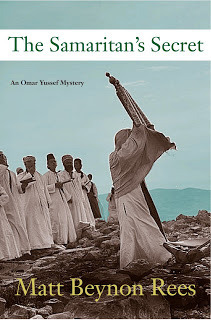
I'm guest-blogger today on Checkpoint Jerusalem, the excellent and delightfully varied blog by McClatchy Newspapers Middle East correspondent Dion Nissenbaum. Dion does a better job of rooting out interesting cultural angles on the news than anyone else covering the Middle East. Under the headline "Jesus was Right: Finding a Good Samaritan", Dion introduces my series of Palestinian crime novels and then posts this contribution from me:
It turns out Jesus was right.
I know, because I found a Good Samaritan.
Really, he was a good guy, and he actually was a Samaritan. There are still a few of them about.
In January, my new Palestinian crime novel, The Samaritan's Secret, was about to be published.
The story unfolds on a West Bank hilltop where the last remnants of the ancient Samaritan tribe live.
There are just 370 of them, high above the violent city of Nablus, near the site where they believe their ancient Temple stood.
To help my readers get a sense of the place, I decided to film a video clip using many of the locations from the book.
My friend, videographer David Blumenfeld. and I headed from our homes in Jerusalem to shoot the video.
The day before, I had spoken with a Samaritan priest to arrange some meetings and to be sure the enclosure around the Temple wouldn’t be locked.
“That depends on the money,” he said, in Hebrew. (The Samaritans mainly speak Arabic, but they also have Israeli ID cards and speak Hebrew. On their Sabbath, they speak nothing but Samaritan, which they believe is true ancient Hebrew.)
As a journalist, I’m not accustomed to paying to interview people.
“How much?” I asked.
“How much do you think?” he ventured.
Oh, no, we’re about to get all Middle Eastern, I thought. I hate haggling.
“Well, let’s say 200 shekels.” That’s about 60 bucks.
He scoffed.
“A thousand.”
I made groaning noises to show that such a figure was painful to me.
“Five hundred.”
“Five hundred,” he said. “See you tomorrow.”
When we reached the village, Kiryat Luza, the day was clear and sunny. The priest met us at the museum -- which he set up some years ago in his living room -- and we filmed a few scenes alongside his trove of photos and old documents.
Before we’d finished, he took out a receipt book: “I’ll do your receipt, shall I? What did we say? A thousand, wasn’t it?”
“No, it was five hundred.”
He started to tell me about how much work we were making him do. I gave him seven hundred and let it go.
Now, the priest was supposed to open the gates to the Temple compound for us. But somehow, after I’d paid him, that duty was delegated to another fellow.
As we filmed, the new guy complained that he needed to go home and eat. (The Samaritan village is about the sleepiest place I’ve ever seen. If anybody up there had anything pressing to do that necessitated hurrying me along, I’d have been very, very surprised.)
So, as we left, I gave him 100 shekels [about $25 US:] and thanked him with my warmest collection of Arabic words of praise.
“Something for the other guy?” he said, pointing at a figure lurking near the gate. “He had to wait too.”
I peeled off 20 shekels more. I hadn’t been squeezed this badly since I was first in the Middle East as an innocent 19-year-old backpacker, shucked for “baksheesh” by every Egyptian within a mile of the Great Pyramid.
David and I had filmed for four hours in a ridiculously hot January sun. I had read my cue-cards in five different languages, and I’d been fleeced until the leather on my wallet started to look raw. Sustenance was in order.
We went down the slope to the village to look for food.
There are only two establishments in the Samaritan village that in any way resemble eateries. “The Good Samaritan Restaurant” would’ve been the best bet, you’d have thought. But it serves no food -- only whiskey.
Next door, the “Guests and Tourists Paradise” was open. Three men smoked cigarettes lazily at one of the tables.
“Is it possible to eat?” I asked.
A tall, thin young man rose and welcomed us. We took a couple of Cokes from the fridge and sat. There was much muttering among the three smokers. Two of them disappeared up the street.
“I think they’ve gone home to ask Mamma to make our lunch,” I said to David.
Certainly no cooking took place in the kitchen at the back of the restaurant. The tall man smiled and nodded.
“No problem,” he said. “Food is coming.”
We waited... and waited... for half an hour. But the food did come, and it was good.
As we left, the young man told me his name was Samih. His father was the High Priest of the Samaritans. He gave me a free poster with historical information about the Samaritans and smiled very broadly.
Then he counted out my exact change.
I left a nice tip.
Published on April 28, 2009 05:58
•
Tags:
arab, arabic, east, good, hebrew, jesus, jew, mcclatchy, middle, nablus, newspapers, palestine, palestinians, samaritan, samaritans
Can't wait for The Corruptionist
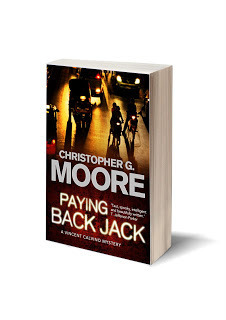
I heard from my chum Christopher G. Moore that he just finished writing the 11th in his series of Vincent Calvino crime novels set in Bangkok. That's good news, because I already read his brilliant and forthcoming Paying Back Jack. (See my review "Elmore Leonard in Bangkok"). Knowing Chris's work, I already love The Corruptionist -- I'm enjoying guessing how he'll use that terrific title and his vibrant cast of characters to take us on another superbly original dive into the underworld of Bangkok.
On his blog, Chris recently wrote about my latest Palestinian crime novel, The Samaritan's Secret. I'm delighted he enjoyed it -- not only because I'm such an admirer of his writing, but also because we share a birthday/a UK publisher/a style of examining the foreign culture in which we live through gritty crime fiction which exposes something you'd never expect about the place. Here's what he wrote:
"Matt Beynon Rees is another author who knows the territory, the people, and the nature of the personal conflicts that separate them. Matt’s turf is Palestine, and his novels are brim with people caught in the vice of poverty, tribal and clan conflict, and facing the constant possibility of violence. He brings Palestine to life. And that is no easy thing.
"One of Matt’s Omar Yussef mysteries does more to take a person into the day-to-day reality of the lives of people in Gaza than a library of newspaper and magazine analysis of Middle East politics. Ultimately understanding countries like the Palestine and North Korea are tied to their history, language, enemies, and traditions. The reality of such a country becomes understandable through emotional lens of the people who live there. Matt channels the sensibility of Graham Greene in this series, building a picture of a time and place that stays with you long after you finish the book."
So while you're waiting for The Corruptionist, get stuck into the first 10 Calvino novels. You won't be disappointed.
Published on June 07, 2009 07:21
•
Tags:
asian, bangkok, calvino, christopher, corruptionist, crime, g, jesus, moore, nablus, omar, palestine, samaritan-s, samaritans, secret, thailand, vincent, yussef
Hot Reading in East Jerusalem!
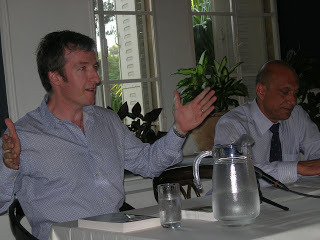
This weekend I was the guest of Munther Fahmi, who runs the excellent bookshop at the American Colony Hotel in East Jerusalem, for a reading from my newest Palestinian crime novel THE SAMARITAN'S SECRET. Munther and I have been scheming for some time to organize an event, so it was great to finally get it together.
I knew it'd be an interesting crowd at the Colony, which manages to be something like neutral ground (although many Israelis might dispute that) in Jerusalem. There were foreign journalists and diplomats, Israelis and Palestinians among the sizeable crowd, including some old friends I haven't seen for some time. Oh, and tourists, too -- a rare species since the intifada, but I signed for visitors from Berlin and Seattle, Ireland and Serbia.
I was also delighted that one of the people on whom I based the character of a World Bank worker in THE SAMARITAN'S SECRET happened to be staying at the Colony this weekend. I was able to give him the news that I'd turned him into a woman and changed his employer. He seemed pleased with both alterations, and I hope he enjoys the book.
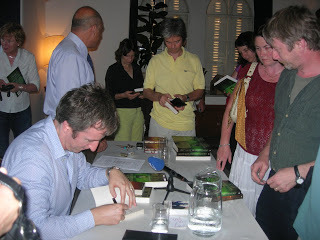
I've edited the photos so that you can't see how hot it became in the room. By the time I was signing the books at the end I was rather inelegantly dripping with sweat. The alternative, of course, was the honking of passing Arab wedding convoys and, as antiglobalization activist Naomi Klein discovered when the windows were opened to let in some air for her reading immediately after mine, the evening call to prayers by the muezzin at the mosque next door. (It's the Mosque of Sheikh Jarrah, named after Saladin's doctor, whose tomb it houses.)
To get on Munther's mailing list for future readings at his excellent bookshop, write to him at bookshopat@gmail.com.
Published on June 28, 2009 03:05
•
Tags:
appearances, book, doctine, globalization, ireland, islam, israel, jerusalem, klein, naomi, nonfiction, omar, palestine, palestinians, samaritan-s, samaritans, secret, shock, tour, yussef
International Noir: Contrast to hardboiled environs gives Omar edge
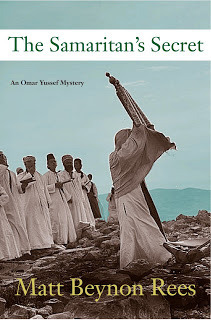
The blog International Noir Fiction describes my series of Omar Yussef Mysteries as creating a "comedie humaine" for the Palestinians. It's a great review of the third of my novels THE SAMARITAN'S SECRET by a reviewer who's obviously read and enjoyed the first two books as well. The review notes many of the aspects of Omar's impulsive, sensitive character which defy the detective genre. I particularly like this: "Rees give us a couple of chase sequences that are nonetheless exciting for Omar Yussef's lack of speed and agility--and are not simply amusing or "cute" as has been the case with some elderly detectives over the years of the genre. INF concludes: "Rees provides insight and also a satisfying crime story."
Published on July 10, 2009 23:07
•
Tags:
blogs, crime, fiction, hardboiled, omar, palestine, palestinians, reviews, samaritan-s, samaritans, secret, yussef
Forward: Palestinian society, warts and all -- and some mortal danger
Robert Rees (no relation) writes about my books in this week's edition of The Forward. Admirably Rob read all three of the books before passing judgment, and a good review it is (as well as an interview, because we spoke for some time on Rob's recent visit to Jerusalem). "Rees has created an award-winning crime series which provides a view of Palestinian society, warts and all, not previously available to a wider public," he writes.
Referring to the latest of my Palestinian crime novels THE SAMARITAN'S SECRET, he continues: "The local color — the dank, ancient casbahs, the bad mountain roads, the smell of angry, sweaty peasants — is rendered effectively. So, too, is the mortal danger. Yussef, visiting Nablus for the wedding of a policeman friend, is quickly sidetracked into a murder case, the consequences of which may prove catastrophic for the Palestinian Authority." Read the full article.
Australian blog Reactions to Reading has a new review of the audiobook of my second Palestinian novel THE SALADIN MURDERS (published in the US as A GRAVE IN GAZA). Blogger Bernadette writes of my detective Omar Yussef: "If bravery is defined as taking action in spite of the fear you feel then Omar Yussef must be the bravest hero of them all" while also being a "terrifically believable character."
I'm also delighted that while she acknowledges the book has a political context, she doesn't feel I was lecturing her.
Referring to the latest of my Palestinian crime novels THE SAMARITAN'S SECRET, he continues: "The local color — the dank, ancient casbahs, the bad mountain roads, the smell of angry, sweaty peasants — is rendered effectively. So, too, is the mortal danger. Yussef, visiting Nablus for the wedding of a policeman friend, is quickly sidetracked into a murder case, the consequences of which may prove catastrophic for the Palestinian Authority." Read the full article.
Australian blog Reactions to Reading has a new review of the audiobook of my second Palestinian novel THE SALADIN MURDERS (published in the US as A GRAVE IN GAZA). Blogger Bernadette writes of my detective Omar Yussef: "If bravery is defined as taking action in spite of the fear you feel then Omar Yussef must be the bravest hero of them all" while also being a "terrifically believable character."
I'm also delighted that while she acknowledges the book has a political context, she doesn't feel I was lecturing her.
Published on July 22, 2009 23:15
•
Tags:
audiobooks, blogs, gaza, grave, murders, omar, palestine, palestinians, profile, reviews, saladin, samaritan-s, samaritans, secret, yussef
New Republic: The Samaritan's Secret a 'wonderful detective thriller'
In his New Republic blog, the magazine's honcho Marty Peretz rightly rails at the failure of the Fatah Party to agree on anything at its conference this week in Bethlehem -- except that Israel killed Arafat. Rails because, of course, that's not going to reform this corrupt bunch of villains who're currently clogging Manger Square with their swanky wheels, nor is it going to improve the daily life of ordinary Palestinians one bit. Peretz then notes: "If you want to read a wonderful detective thriller by Matt Beynon Rees, whom L'Express called "the Dashiell Hammet of Palestine," pick up The Samaritan's Secret, in which Arafat's late life and death lurk as vivid presence and macabre ghost."
Published on August 06, 2009 22:37
•
Tags:
beynon, blogs, east, fatah, ghosts, matt, middle, palestine, palestinians, plo, rees, samaritan-s, samaritans, secret



